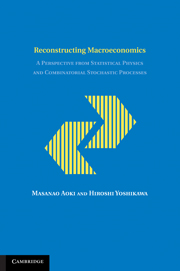 Reconstructing Macroeconomics
Reconstructing Macroeconomics Published online by Cambridge University Press: 08 August 2009
Unemployment is one of the most important problems in economics. Macroeconomics as a discipline was born through economists' efforts to better understand unemployment. Despite piles of works on the subject, it is still a matter of dispute. Some economists see unemployment as nothing but a particular type of rational economic activity, namely job search. Others take it as a sign of waste of the most important production factor; it costs both the unemployed and the economy as a whole.
This chapter explains that the approach we propose gives us a new perspective on the labor market and unemployment. It follows the tradition of search theory, but differs from the existing literature in one important respect. As explained in Chapter 3, our model is based on the notion of stochastic equilibrium which is conditioned by aggregate demand. In this chapter, extending the model in Chapter 6, we show that unemployment due to demand deficiency and “structural” unemployment cannot be so clearly separated as one might think. This suggests that the natural unemployment may not be defined clearly independent of the level of aggregate demand.
We also show that Okun's law, which puzzles many, can be quite naturally explained. In our analysis, the notion of equilibrium as distribution plays the central role. The equilibrium distribution is conditioned by aggregate demand.
Background
There are different approaches to labor market and unemployment. Let us begin with the assumption that the labor market were a single homogeneous market.
To save this book to your Kindle, first ensure [email protected] is added to your Approved Personal Document E-mail List under your Personal Document Settings on the Manage Your Content and Devices page of your Amazon account. Then enter the ‘name’ part of your Kindle email address below. Find out more about saving to your Kindle.
Note you can select to save to either the @free.kindle.com or @kindle.com variations. ‘@free.kindle.com’ emails are free but can only be saved to your device when it is connected to wi-fi. ‘@kindle.com’ emails can be delivered even when you are not connected to wi-fi, but note that service fees apply.
Find out more about the Kindle Personal Document Service.
To save content items to your account, please confirm that you agree to abide by our usage policies. If this is the first time you use this feature, you will be asked to authorise Cambridge Core to connect with your account. Find out more about saving content to Dropbox.
To save content items to your account, please confirm that you agree to abide by our usage policies. If this is the first time you use this feature, you will be asked to authorise Cambridge Core to connect with your account. Find out more about saving content to Google Drive.